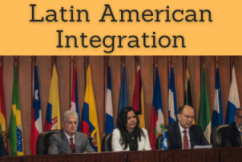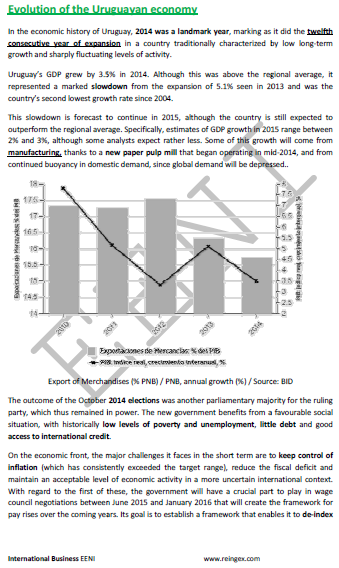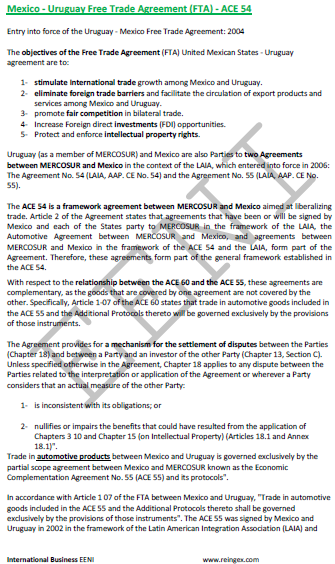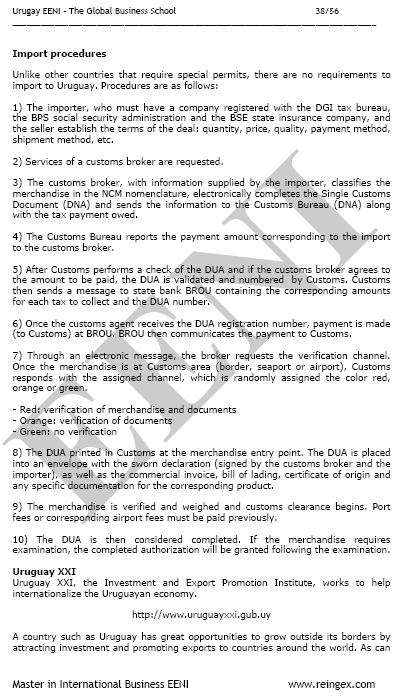Business in Uruguay, Montevideo

Uruguay: the political centre of South America (ALADI, MERCOSUR) Financial Services
- Introduction to Uruguay (South America)
- Uruguayan Economy
- Business in Montevideo
- Uruguayan International Trade
- Export and import formalities
- Investment in Uruguay
- Key Uruguayan Sectors:
- Industry
- Food products
- Information and communication technology
- Tourism
- Financial services
- Case Study:
- Eastern Forest
- Cristalpet
- Access to the Uruguayan Market
- Business Plan for Uruguay
The aims of the subject “Foreign Trade and Business in Uruguay” are the following:
- To analyze the Uruguayan Economy and Global Trade
- To know the trade opportunities in Uruguay
- To explore the Uruguayan trade relations with the country of the student
- To know the Uruguayan Trade Agreements
- To examine the profile of Uruguayan Companies
- To develop a business plan for the Uruguayan Market

The Subject “Foreign Trade and Business in Uruguay” belongs to the following Online Programs taught by EENI Global Business School:
Masters: International Business, Foreign Trade.
Languages:  (or
(or  Uruguay
Uruguay  Uruguai
Uruguai  Uruguay).
Uruguay).
- Credits of the subject “Doing Business in Uruguay”: 1

- Duration: one week

International Trade and Business in Uruguay.

Uruguayan Preferential Access and Agreements.
- Uruguay and the Latin American Economic Area
- MERCOSUR
- MERCOSUR Trade Agreements: Andean Community, Mexico, Peru, Chile, India, Egypt, Israel, the EU, SACU
- Mexico-Uruguay Agreement
- Uruguay-Gulf Cooperation Council (GCC) Agreement
- Andean Community (associate member)
- Latin American Integration Association (ALADI)
- Union of South American Nations (UNASUR)
- Latin American and Caribbean Economic System
- Trade Negotiations Among Developing Countries
- Global System of Trade Preferences among Developing Countries (GSTP) - accession process
- SICA (observer country)

- WTO
- Agreement on Sanitary and Phytosanitary Measures
- GATS
- Agreement on Technical Barriers to Trade
- Agreement on Preshipment Inspection
- Agreement on Safeguards
- Trade Facilitation Agreement
- WCO
- TIR Convention (Road Transport, IRU)

- ECLAC
- East Asia-Latin America Cooperation
- Summit South American-Arab Countries
- Inter-American Development Bank
- OAS
- Africa-South America Summit
- CELAC

- UN
- WB
- IMF
- CPLP (observer country)
The Oriental Republic of Uruguay
- Uruguay is a gateway and the geographical centre of the MERCOSUR (295 million people)
- Uruguay is the political and financial centre of South America
- The Headquarters of the MERCOSUR and the Latin American Integration Association (ALADI) are in Montevideo
- Uruguay has a long political and economic stability
- According to “The Economist,” Uruguay is considered as the most democratic Latin American Economy
- Uruguay has an established a political party system and is the first country in Latin America, along with Chile, with the less Corruption Perceptions Index (“Transparency International”)
- According to the UN Development Programme, Uruguay is the third country in Latin America (after Argentina and Chile), with the highest Human Development Index; 98% of the Uruguayan population has access to drinking water and electricity
- Borders of Uruguay: Brazil and Argentina
- Uruguayan Population: 3.3 million people
- Area of Uruguay: 176,215 km²
- Capital of Uruguay: Montevideo
- Uruguayan currency is the peso (UYU)
- The official language of Uruguay is Spanish
- Uruguay is administratively divided into nineteen departments
- Abolition of Slavery in Uruguay: 1842
- African Diaspora in Uruguay: 0.1 million people (4% of the Uruguayan population)
The main religion in Uruguay is Christianity (2.3 million Catholics).

Uruguay belongs to the Latin American Economic area of the Western Civilization.
Uruguayan Economy
- The economic activity has augmented considerably within a context marked by the inflation under control and public sector accounts in line with the objectives of the Government of Uruguay
- The Uruguayan services sector (financial, logistics and transport, and communications) has grown considerably in the recent years
- We must emphasize the significant information technology (IT) growth, including the software development and related services
- Manufacturing growth (opening of a pulp mill)
- Uruguayan currency: Peso (UYU). Flexible exchange rate

Montevideo, the capital of Uruguay, is geographically the main Maritime cargo route of the MERCOSUR, the integration axis with Argentina, Brazil, and Paraguay to be within the influence area of almost 200 million people, with the highest GDP per capita in Latin America.


International Trade of Uruguay.
- Uruguay is the largest software exporter per capita in Latin America and third in absolute terms
- Uruguay is eminently an agricultural export Economy
- Uruguayan exports rose 2.5%, and imports saw a drop of 8.6%, which led to a positive net external balance
- The largest Uruguayan export product is soy (67 million dollars), accounting for 21% of the exports from Uruguay
- The Oriental Republic of Uruguay has diversified its exports destination
- Main Uruguayan export destinations are the Free Zone of Nueva Palmira, Brazil (15%), Russia (7%), and Argentina (7%)
- Brazil is the second-largest export destination, the main exported products barley malt (17.6%) and whole milk powder (11.5%)
- Uruguayan private sector has grown at a sustained speed
- Foreign direct investment (FDI) reached a historical record
Global Trade and Business in Uruguay:

Uruguayan Free Zones.
- The promotion and development of free zones to the foreign direct investment encouragement, exports, employment, and international economic integration have been declared of national interest by law
- There are now free zones in Colonia, Nueva Palmira, Montevideo, Florida, Rivera, Black River, New Helvetia, and Freedom
(c) EENI Global Business School (1995-2024)
We do not use cookies
Top of this page



